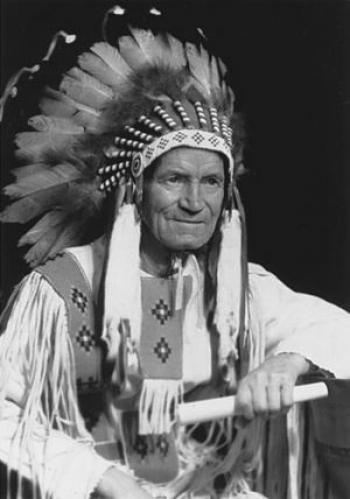By Marie Burke
Windspeaker.com Archives
In the late 1950s, the Upper House of Parliament dusted off a seat for James Gladstone, a member of the Blood tribe of Alberta.
He was Canada's first Aboriginal senator and his official appointment to the Senate was made on Jan. 31, 1958.
At the time of Gladstone's appointment, a person in Canada was described as anyone but an Indian. Native people did not have the right to vote in a federal election and few treaty Indians ‘owned’ land.
In fact, the lawful possession of land on reserve by Aboriginal people could be approved only by the minister of Indian Affairs through a certificate of possession.
The Indian Act was used to provide protection of the land-base for First Nations communities. Gladstone was the senator for Lethbridge, Alta., and though he was described as an independent, (in the Canadian Parliamentary Guide, as Gladstone stated he had no political affiliation as "treaty Indians do not have the franchise") he was seen as a Progressive Conservative.
A couple of years before Gladstone's appointment, John Diefenbaker, prime minister at the time, was quoted as saying that one of the finest gestures his government could make would be to appoint a full-blooded Indian to the Senate of Canada.
There was, however, a hitch.
Parliament's rules required that a senator, upon appointment, must hold real property, free and clear, that was valued at no less than $4,000.
A senator must also reside in the designated area, or have real property in the division for which he was appointed.
When Gladstone accepted the Senate appointment in early January 1958, he was asked to buy land off reserve. Gladstone quickly bought property near Cardston, Alta., valued at $6,700, selling some of his cattle to do so.
In his inaugural speech, Gladstone addressed the Senate in Blackfoot. The Speaker of the House recognized only the two official languages, French and English, and no one knows what Gladstone said to the Speaker that allowed him to break the Senate tradition.
Gladstone saw several changes pass through the Upper House of Parliament. In 1960, he had the satisfaction of moving the bill through the Senate that gave federal voting privileges to Indians.
During his 13 years in the Senate, he was also part of various stormy revisions to the Indian Act. At the time of his appointment, Gladstone was nearly 70.
He retired in 1971 when he was 84 and died later that same year. The name "the Gentle Persuader" was given to Gladstone because of his efforts to bring attention to the needs and concerns of Aboriginal people in Canada.
Hugh Dempsey is the author of The Gentle Persuader, a book about Gladstone.

